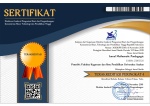PERBANDINGAN KEEFEKTIFAN PENDEKATAN PROBLEM SOLVING DENGAN PROBLEM POSING
Abstract
References
Agullard, K. & Goughnour, D. S. 2006. Central office inquiry: Assessing organi-tation, roles, and actions to support school improvement. San Francisco: WestEd.
Akay, H. & Boz, N. 2010. The effect of problem posing oriented analyses-II course on the attitude toward mathe-matics and mathematics self-efficacy of elementary prosepective mathematics teachers [Versi electronik]. Australian Journal of Teacher Education, 35(6): 59-75.
Akinsola, M. K. & Olowojaiye, F. B. Februari 2008. Teacher instructional methods and student attitudes towards mathe-matics. International Electronic Journal of Mathematics Education, 3, 1, 60-73. Diambil pada tanggal 30 September 2013, dari http://www.iejme.com/012008/d4.pdf.
Anggo, M. 2011.a. Pelibatan metakognisi dalam pemecahan masalah matematika. Edumatica 1(1): 25-32.
Anggo, M. 2011.b. Pemecahan masalah matematika kontekstual untuk meningkatkan kemampuan metakognisi siswa. Edumatica, 1(2): 35-42.
Brownlie, F., et al. 2003. Enhanching learn-ing: Report of the student achievement task force. British Columbia. Diambil pada tanggal 11 November 2013, dari http://www.bced.gov.bc.ca/taskforce/achieve_task_rep.pdf.
Dehyadegary, E., et al. 2012. Academic enga-gement as a mediator in relationships between emotional intelligence and academic achievement among adoles-cents in kerman-iran [Versi electronik]. Journal of American Science, 8, 9, 823-832.
Demir, B. B. 2005. The effect of instruction with problem posing on tenth grade students’ probability achievement and attitudes toward probability. Tesis Magister, tidak diterbitkan, Midle East Technical University, Nallihan-Ankara.
Guvercin, S., Cilavdaroglu, A. K., & Savas, A. C. 2014. The effect of problem posing instruction on 9th grade students’ mathe-matics academic achievement and retention [Versi electronik]. Anthropologist. 17(1): 129-136.
Hara, S. R. & Burke, D. J. 1998. Parent involvement: The key to improved student achievement [Versi electronik]. School Community Journal. 8(2): 219-228.
Herman, T. 2007. Pembelajaran berbasis masalah untuk meningkatkan kemampuan penalaran matematis siswa SMP. Cakrawala Pendidikan, 26(1): 41-62.
Ignacio, N. G., Nieto, L. J. B., & Barona, E. G. Oktober 2006. The affective domain in mathematics learning. International Electronic Journal of Mathematics Education, 1, 1, 16-32. Diambil pada tanggal 11 September 2013, dari http://www.iejme.com/012006/d2.pdf.
Jannah, M., Triyanto, & Ekana, H. 2013. Penerapan model missouri mathematic project (mmp) untuk meningkatkan pemahaman dan sikap positif siswa pada materi fungsi. Jurnal Pendidikan Matematika Solusi. 1(1): 61-66.
Junaidi. 2012. Perbandingan pembelajaran matematika dengan pendekatan open ended dan problem solving ditinjau dari sikap siswa terhadap proses pembelajaran matematika dan kemampuan pemecahan masalah matematika di kelas X SMAN 1 Pringgarata Lombok Tengah tahun ajaran 2011/2012. Tesis Magister, tidak diterbitkan, Universitas Negeri Yogyakarta, Yogyakarta.
Kaune, C. 2006. Reflection and metacognition in mathematics education-tools for the improvement of teaching quality [Versi electronik]. ZDW, 38, 350-360.
Kennedy, L. M., Tipps, S., & Johnson, A. 2008. Guiding children’s learning of mathematics (11th ed.). Belmont: Thomson Wadsworth.
Lavy, I. & Shriki, A. (2007). Problem posing as a means for developing mathematical knowledge of prospective teachers. Proocedings of the 31st Conference of the International Group for the Psychology of Mathematics Education. 3: 129-136.
Leonard & Supardi. 2010. Pengaruh konsep diri, sikap siswa pada matematika, dan kecemasan siswa terhadap hasil belajar matematika. Cakrawala Pendidikan. 29(3): 341-352.
Lovat, T., et al. 2011. Value pedagogy and student achievement: Contemporary research evidence. London: Springer Science+Business Media.
Mahmudi, A. 2013. Srategi metakognitif dalam pembelajaran matematika. Prosiding Seminar Nasional Penelitian, Pendidikan dan Penerapan MIPA, Fakultas MIPA, Universitas Negeri Yogyakarta, PM-49–PM-53.
McKinley, J. 2010. Raising black students’ achievement through culturally respon-sive teaching.
Alexandria, VA: ASCD.Muslimin, Z. I. 2012. Prestasi belajar mahasiswa ditinjau dari jalur penerimaan mahasiswa baru, asal sekolah, dan skor tes potensi akademik. Jurnal Penelitian Psikologi. 3(1): 381-393.
Mustamil, H. 2012. Pengembangan Perangkat Pembelajaran multilevel dengan pendekatan problem solving untuk meningkatkan sikap dan prestasi belajar matematika siswa smp pada materi lingkaran. Tesis Magister, tidak diterbitkan, Universitas Negeri Yogyakarta, Yogyakarta.
Ozsoy, G. & Ataman, A. Maret 2009. The effect of metacognitive strategy training on mathematical problem solving achievement. International Electronic Journal of Elementary Education, 1, 2, 67-82. Diambil pada tanggal 22 September 2013, dari http://www.iejee.com/1_2_2009/ozsoy_ataman.pdf.
Presiden RI. 2006. Peraturan Pemerintah RI Nomor 23, Tahun 2006, tentang Standar Kompetensi Lulusan untuk Satuan Pendidikan Dasar dan Menengah.
Risnanosanti. 2008. Melatih kemampuan metakognitif siswa dalam pembelajaran matematika. Semnas Matematika dan Pendidikan Matematika, 2-115–2-123.
Schraw, G. & Moshman, D. 1995. Metacognitive theories [Versi electronik]. Educational Psychology Papers and Publication. 7(4): 351-371.
Sudradjat. 2008, Januari. Peranan matematika dalam perkembangan ilmu pengetahuan dan teknologi. Makalah disajikan dalam Seminar Sehari “The Power of Mathematics for all Aplications”, di UNISBA.
Van de Walle, J. A. 2008. Matematika sekolah dasar dan menengah (6th ed.). (Terjemahan Suyono). Jakarta: Penerbit Erlangga. (Buku asli diterbitkan tahun 2007).
Williams, J. P. & Atkins, J. G. 2009. Hand-book of metacognition in education. Dalam D. J. Hacker, J. Dunlosky, & A. C. Graesser (Eds.), the Role of Metacognition in Teaching Reading Comprehension to Primary Students (pp. 26-43). New York, NY: Routledge.
Wong, K. Y. 2012. Use of student mathematics questioning to promote active learning and metacognition. 12th Inter-national Congress on Mathematical Education, 1-15.
Wong, O. K. & Casing, D. M. 2010. Equalize student achievement: Prioritizing money and power. Maryland: Rowman & Littlefield Education.
Yuan, X. & Sriraman, B. 2011. The elements of creativity and giftedness in mathematics. Dalam B. Sriraman & K. H. Lee (Eds.), An Exploratory Study of Relationships between Students’ Creativity and Mathematical Problem-Posing Abilities: Comparing Chinese and U.S Students (pp.5-28). AW Rotterdam: Sense Publishers
DOI: https://doi.org/10.36294/jmp.v1i1.148
Refbacks
- There are currently no refbacks.





